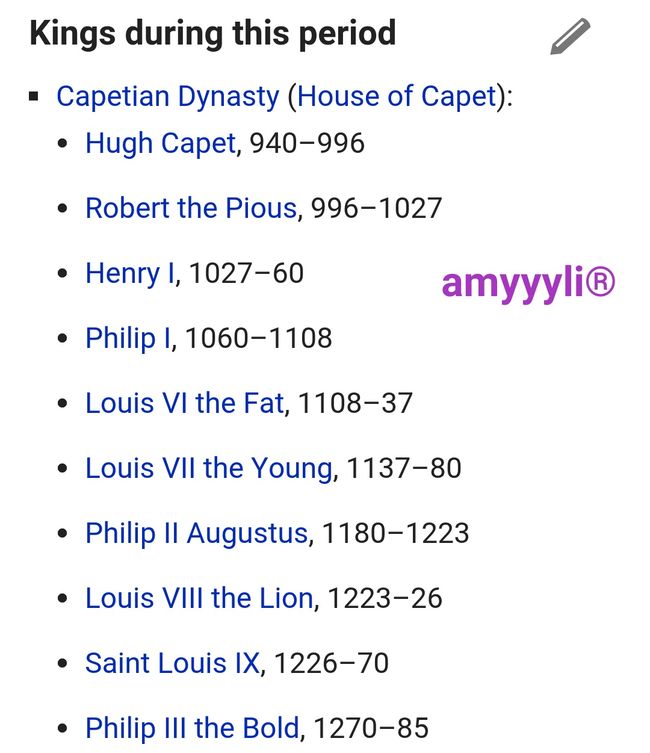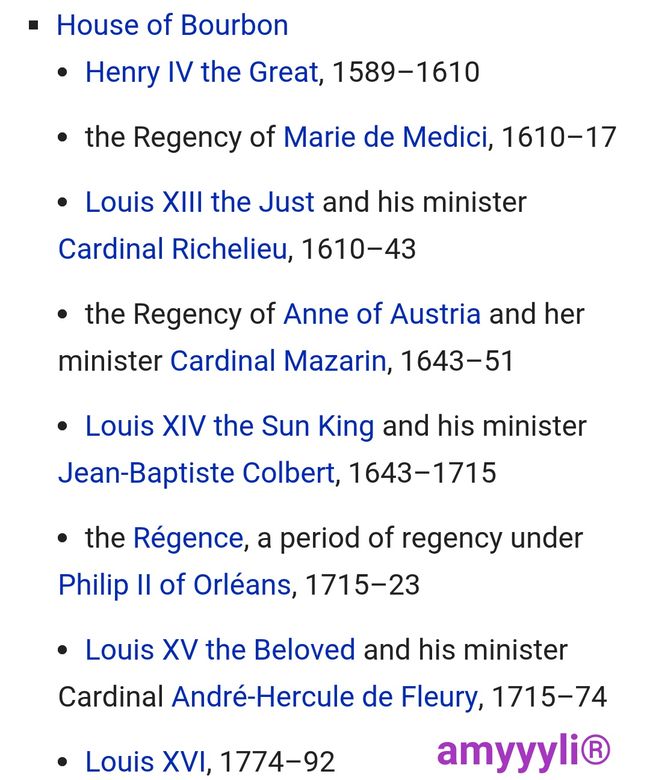~1~ Merovingian dynasty
After the fall of Roman Empire, in 486, Clovis I led his Franks into Paris and established his Frankish kingdom - Merovingian dynasty. His four sons divided the kingdom. By the time of Muslim invasion, the kings has very little power. The mayors of palaces are the ones in power.
~2~ Carolingian dynasty
Charles Martel, a mayor of palace, defeated the Muslims in 732, and won himself fame. His son, Pepin the short, established Carolingian dynasty and became the king of Franks in 751. Pepin's son, Charlemagne, reunited and strengthened the kingdom. He is crowned by Pope Leo III as Roman Emperor. His son, Louis the Pious, did a good job keeping the kingdom together. At his death, however, the kingdom was divided into three by his three sons. The imperial title held in the western area became future French Kingdom and eastern future Germany.
~3~ Capetian dynasty
During the Siege of Paris by Viking in 885, Count Odo of Paris/King Odo and his brother King Robert (Their father being Robert the Strong, whom the Robertians are named after.) defended Paris for almost a year before the Charles the Fat come to rescue. Instead of fighting, Charles allowed them to go up Reine and promised a payment of 257kg of silver. This incident caused many criticism towards Charles and respects for Robert and Odo.
At the death of Charles, Odo and Robert were both elected as kings. So for a while, the Robertians (or Capetians) are both the prince and the king. Then Robert's grandson, Hugh Capet, overtook Carolingians and established Capetian dynasty. Hugh Capet made sure his son was crowned before his own demise, so that the kingdom was not split. At this point onward, monarchy power finally grew strong enough to overcome barons.
~4~ Early Modern France
The Capetian dynasty survived well into the early modern France, despite Black Death, varies wars including the English-French War or so called "the Hundred Years' War". There were two times House changes however. The first time was when Charles IV the fair died without a male a heir, so the throne was passed on to his cousin Philip VI from House of Valois. The second time was when Henry III was assassinated by Catholic activist for his support to Protestants, which was viewed as a heresy by the traditional Catholics. He died with male heirs, thus the throne was passed to his cousin Henry IV the Great or so called Good King Henry from House of Bourbon. He led the fight against the Catholics, and was assassinated too by a Catholic fanatic.
The last king of France was Louis XVI. When the Kingdom was passed on to him, the state was practically bankrupted from wars. He tried to help the financial situation by adding a new land tax, which triggered French Revolution and in turn, his own execution and the end of French royalty.
~5~ Napoleonic Period
After sometime of Chaos, a Republican government is established, but so was the European military coalition against France. As the war broke out, a young general stood out. He was Napoleon Bonaparte. In 1799, he held a coup and became the first Consul of the Republic, then further in 1804 a Emperor of First French Empire. He had won many battles in his life, but in 1813 he was heavily outnumbered by the Allied coalition and lost in the Six Days Campaign. He was exiled to Elba in 1814. He tried ones more by seize over France in the Hundred Days, but was once again defeated at the Battle of Wateloo and exiled.
~6~ Modern France
After Napoleon's fall, France was continually switching between Republic and Empire. Until 1958, Charles de Gaulle second time in power and established the Fifty Republic with himself being the head of the government.



